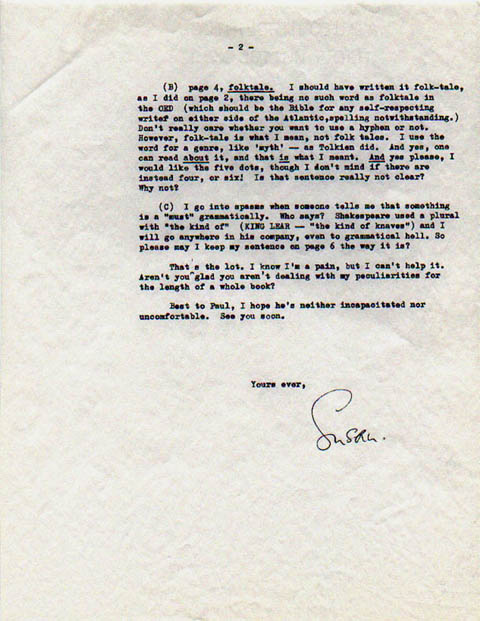Susan Cooper Letter to Ethel L. Heins (May 10, 1976)


Winchester, Mass 01890
10th May 1976
Dear Ethel,
I was in Margaret’s office when your letter and photocopy of the Newbery speech arrived, so carried them off.
If you were afraid you might be sounding persnickety just wait till you read me!
I am starting on the assumption that since this is a reprint of my speech, rather than a piece of copy submitted for acceptance by the Horn Book, you will in the last resort let me have my own way with the text, however odd that way may seem to you as an editor. Hope that’s right. Tell me if it isn’t.
When you go through the text you will find that I have in a very large number of places removed copy-editing changes in punctuation and phrasing, and marked an arrogant ‘stet’ to keep my original. As anyone who is unfortunate enough to publish me discovers, I write more like a musician than a literary academic; I score my prose very deliberately, to produce a certain rhythm in the reader’s mind, and every comma has a purpose. This drives copy-editors with a housesheet to follow right out of their minds, but is the basis of any merit my prose may have. So — I’m sorry about all the little green marks saying ‘stet’ or ‘delete’, but there it is, you are stuck this year with a very peculiar writer. Be patient with me.
Separate points:
(A) “We always give publishers with book titles” says a note on the copy. So you do, in articles, but this is not an article, it is a printed copy of what somebody said at the ALA banquet I did not (or rather shall not) recite the names of publishers every time I mention a book. For reference purposes, those names will have already been set out by you in Margaret’s preceding piece about me. Therefore please please let’s leave out the duty parentheses in my speech.
[page2]
(B) page 4, folktale. I should have written it folk-tale, as I did on page 2, there being no such word as folktale in the OED (which should be the Bible for any self-respecting writer on either side of the Atlantic, spelling notwithstanding.) Don’t really care whether you want to use a hyphen or not. However, folk-tale is what I meant not folk tales. I use the word for a genre, like ‘myth’ -- as Tolkien did. And yes, one can read about it, and that is what I meant. And yes please, I would like the five dots, though I don’t mind if there are instead four, or six! Is that sentence really not clear? Why not?
(C) I go into spasms when someone tells me that something is a “must” grammatically. Who says? Shakespeare used a plural with “the kind of” (KING LEAR — “the kind of knaves”) and I will go anywhere in his company, even to grammatical hell. So please may I keep my sentence on page 6 the way it is?
That’s the lot. I know I’m a pain, but I can’t help it. Aren’t you glad you aren’t dealing with my peculiarities for the length of a whole book?
Best to Paul, I hope he’s neither incapacitated nor uncomfortable. See you soon.
Yours ever,
[signed: Susan]
RELATED
ALREADY A SUBSCRIBER? LOG IN
We are currently offering this content for free. Sign up now to activate your personal profile, where you can save articles for future viewing.







Add Comment :-
Be the first reader to comment.
Comment Policy:
Comment should not be empty !!!